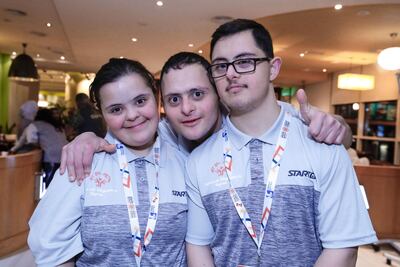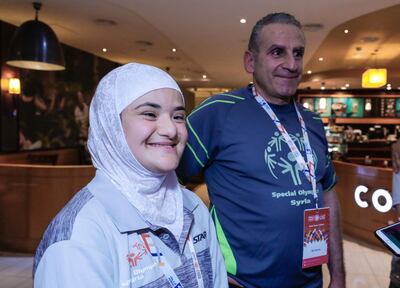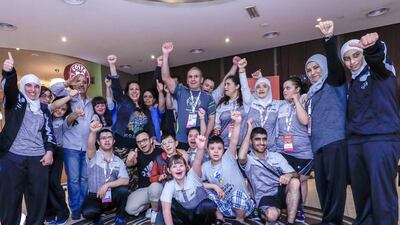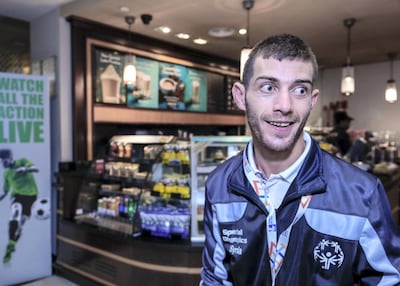The road to the Special Olympics requires intensive training and determination but for the Syrian athletes, it also meant overcoming the chaos of war.
The team of 107 athletes from across Syria will compete in 16 sports at the World Games in Abu Dhabi next week.
Their journey to the UAE capital has required a great deal of organisation, flexibility and sometimes, even dodging fire.
“There were times when a shell would land in the middle of the pool or gym but that never stopped us. The authorities cleared it off quickly and we would continue,” said Mohanad Taha, sports manager of Syria’s Special Olympics Foundation.
“We did not allow the war to stop us. In fact, we became more determined to join international championships and win medals. We went to Los Angeles, Athens and Austria.”
The team gathered athletes from all of Syria’s provinces. To get around issues of travel within the country, a manager had to be appointed for each sport in each of the provinces.
Fifteen days before travelling to Abu Dhabi, they held a unified boot camp in Damascus for all the athletes.
The team also made sure to include new athletes who never participated in championships abroad.
“We always make 40 per cent of the team first-timers. That way we give everybody a chance to travel. We like to win but our goal is also to make everybody feel the honour of being part of the team,” said Mr Taha.
Parents also played a big role in forming the team.
“They always brought their children to practice, even when the security situation was at its worse,” he said.
The athletes were obliged to train three times a week, regardless of the situation on the ground.
The team was inevitably reduced because of visa issues.
“We were supposed to participate with 142 athletes but not everybody’s visa came out,” said Mr Taha.
“We also had a problem with the coaches’ visas. For a couple of sports, the athletes’ visas came through but not their coaches.”
They tried to remedy the situation by assigning more teams to the coaches who were able to travel.
“But that could affect the athletes’ performance. When you are used to your coach and waiting for their encouragement at the most critical time, it could bring you down not to find them there.”
Nonetheless, spirits seemed high among the athletes as they excitedly chatted over dinner at the hotel where they were staying in Abu Dhabi.

Abdulrahman Al Halabi, a 24-year-old powerlifter, proudly played a video of his last record on his mobile phone.
During his last competition, in Egypt in 2015, he dead lifted 120kg and at the gym, where he trains in Damascus, he was able to lift 140kg.
“We are hoping he will record it now in Abu Dhabi,” said his coach Zarieh Balian.
Since he began power lifting in 2012, Mr Al Halabi has earned gold, silver and bronze medals.
“I love powerlifting because it makes me feel powerful and I am looking forward to raise my head high, and my coaches and everybody who supported me,” he said.
Asmaa Nasreldeen, 24, shares the same passion. Her late father took her to train with coach Balian for the first time in 2011.
“And I immediately fell in love with the game,” she said.
She earned four bronze medals in her first international championship in Athens.
She also competed in Egypt, Los Angeles and the Winter Games in Austria.
“They picked her to join the skiing team, and she had never skied professionally before,” said the coach.
She earned her team a silver and bronze medal.

Abdulrahman Al Khayat, 23, who will be competing in rollerblading, was selected to join the regional games in Abu Dhabi last year. But an error in registering his name meant he could not go.
“Now I am participating in the Olympics so I guess it turned out for the best,” he said.
Mr Al Khayat took up the sport four years ago after a coach picked him for a group of his friends as they played at a park.
“She saw that we were fit and were able to perform certain moves and invited us to join the roller blading team,” he said.
Mr Khayat trained every day after school hours.
“My first competition was a local one in Deir Atiyah [a city 75km south of Homs]. I won two gold medals.”
He then took part in a national competition in Damascus but will be making his international debut in Abu Dhabi next week.



